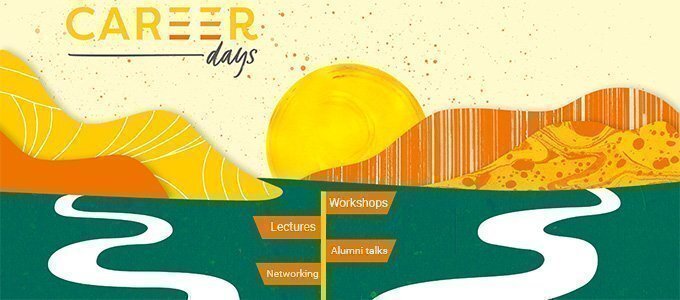 |
Events
- From 11 to 13 November, the Career
Days for doctoral researchers and
postdocs will take place at the University of Jena.
You will get an insight into career paths in science
and learn about strategies to find a job in business
and society. We cordially invite you to our networking
event on the evening of 13 November.
- How does the German Research Foundation (DFG)
review research proposals, and who ultimately
decides on funding? What are the possible pitfalls
when submitting proposals? On 21 October,
two members of DFG review boards will give a first-hand
account of their work and provide insights
into the decision-making processes surrounding
research proposals. The event will be in German.
- The interdisciplinary
symposium "Aus dem Konzept gebracht"
(Thrown off balance) will discuss the different
understandings of 'sex' and 'gender' in various
academic cultures. It will take place on 24 October
in the lecture hall of the ThULB. The language will
be German.
- It's Mental Health Autumn: From 28 to 30 October,
the network "Healthy Universities in Thuringia" is
organising a hybrid
event series on the topic of mental
health for all members of Thuringian universities.
An English workshop is offered on 29 October on "Resilience
& Self-Care – Mental Strength for
International Researchers in Germany".
Furthermore, there will be Mental
Health Awareness Days for doctoral
candidates and postdocs from 2 to 4 December.
- How will academic career structures in Germany
change in the future? What impact will the tenure
track principle have on this? A (German) lunch
talk on this topic will be held on 30
October. The results of the tenure track conference,
which was co-organised by the University of Jena in
May, will be presented and discussed.
- On 26 November, the 4th symposium of the
'Life' profile line will take place at the
Centre for Applied Research. This year's motto is "Time
to Connect". There will be a keynote lecture,
researcher speed dating and various other
opportunities for networking with local researchers,
companies and institutions.
- The Thuringian Research Data Management Network
will launch a new season of its popular Coffee
Lectures in October. Following the motto "Research
Tools 4 All", the lectures will present, among
others, AI tools, the new electronic lab notebook
eLabFTW, and a platform for text analysis.
|
|
|
 |
Get
involved
- Meeting people from other countries can be a bit
scary, whether it's talking to them or just
socialising. The iKomPass
certificate programme helps university
employees in Jena build their intercultural skills,
improve their language abilities, and reflect on
their experiences with colleagues. It offers a bunch
of ways to learn, like workshops, language courses,
and an optional trip abroad.
- Projects that promote diversity in academia can
apply now for funding by the ‘Diversity
Connects’ scheme of the German Federal
Ministry of Education and Research. The funding
amounts to up to €50,000 for a maximum period of 18
months. Universities, student organisations,
associations and foundations can apply until 31
October.
|
|
|
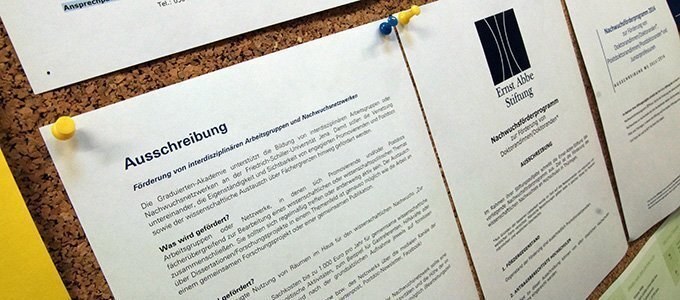 |
Announcements
- The Carl Zeiss Foundation is announcing a programme
to promote interdisciplinary postdoctoral groups.
The Nexus Programme offers postdoctoral researchers
the opportunity to establish their own
interdisciplinary research group over a period of
five to six years. Funding of €1.5 million is
available for personnel and material costs in the
programme. The deadline for submitting a project
proposal is 16 October.
- The Hector Fellow Academy announces the „Hector
Research Career Development Award“.
Eligible are W1 professors, junior research group
leaders and advanced postdocs from natural or
engineering sciences, medicine or psychology.
Project duration is three years. The funding amounts
to 25,000 Euro for personal research funds, a
doctoral researcher’s position and material
expenses. Application deadline is 30 October.
- The ‘IMPULSE
– project’ funding scheme of University
of Jena is aimed at postdocs in the early and
advanced postdoc phase. 10,000 respectively 20,000
euros are granted for research projects that will
lead to a third-party funding application in the
following year. The application deadline is 31
October.
- The Federal Ministry of Research, Technology and
Space is offering postdoctoral
starting grants in the funding programme
‘Future eHealth’. The project duration is usually
three years. The funding covers the postdoctoral
position itself and, if necessary, additional
personnel costs. The application deadline is 17
November.
- The Gerda Henkel Foundation supports research
projects in the humanities. Applications
can be made for postdoctoral positions, doctoral
scholarships, student assistant positions, material
resources or travel grants. Funding is limited to a
maximum of 24 months. The application deadline is 20
November.
- The Christiane Nüsslein-Volhard Foundation awards
scholarships
to young female scientists with children.
The financial support is intended to cover
additional childcare or help with household chores,
allowing for more time to pursue scientific
qualifications and raise one's profile. The grant
amounts to 500 euros per month over a period of one
year. The application deadline is 30 November.
|
|
|
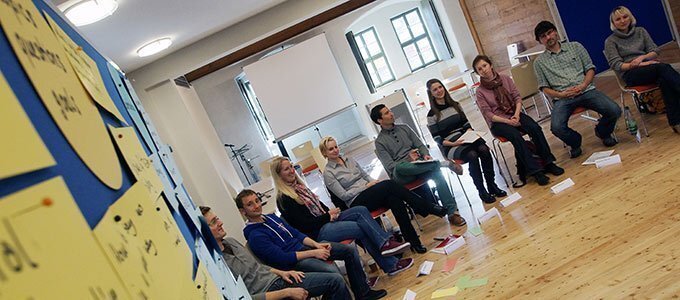 |
Qualification
offers
There are still vacancies in the following online and
on-site workshops:
- Graduate Academy:
- Lehre Lernen:
- Service Center Research and Transfer (SFT):
- Competence Center Digital Research (zedif):
|
|
|
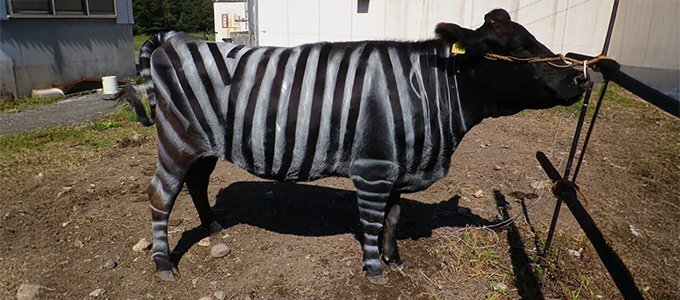 |
This
may be of interest to you
- Two
groundbreaking recommendations for restructuring
of the German academic system were presented
in the summer: The University Association of
Advanced Graduate Training advocates
that supervision of the doctoral project and review
of the dissertation should not be done by the same
person, and pleads for an end to the current grading
system (it should only be "pass" or "fail").
Germany's highest scientific advisory body, the
Science Council, further recommends
that universities develop their academic staffing
structure according to a new system: there should be
three job categories in research, teaching and
academic management, each with four career levels.
It also recommends that universities change their
professorship-oriented structure towards a
departmental structure.
- This year's IgNobel Prizes were awarded
in September. The IgNobel Prizes honour research
projects that use scientific methods to investigate
unusual questions. This year's prize in the biology
category, for example, went to a study
that investigated whether cows painted like zebras
(see picture above) are less likely to be bitten by
mosquitoes (yes, they are). The physics prize went
to an international research team that used physical
methods to investigate how Cacio e Pepe spaghetti
sauce changes during the cooking process. The article
also includes a recipe for how to perfectly make the
dish.
- An online game on the topic of diversity
has been developed
by Saarland University. In it, academics can
practise how to respond appropriately to challenging
communication situations – using fictional dialogues
from everyday university life. The game is available
in German and English and free to use.
- A new website shows the global migration
routes of whales. Data from thirty years of
satellite-based whale tracking has been compiled by
several universities for this purpose. On the
resulting interactive
platform, ‘bluecorridors.org’, you can follow
the routes of different whale species and find out
about potential dangers along these routes.
|
|
|
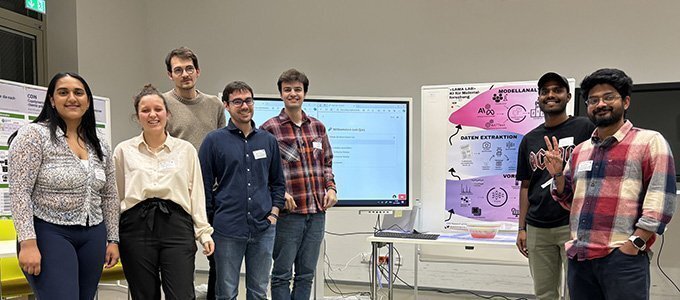 |
News
from University of Jena
- A research group at the
University of Jena has received
the national award for the best research
environment of 2024: The ‘LAMA Lab: Laboratory
for AI in Materials Science’ led by junior research
group leader Dr Kevin M. Jablonka was honoured
by the Young Academy and the Volkswagen Foundation
in the summer (see picture). The team has succeeded
in actively promoting a collaborative and supportive
team culture despite the fast-paced, often isolated
nature of computer science research. As a prize, the
research group will now receive 10,000 euros for
team-building activities.
- The University of
Jena has appointed
social psychologist Prof. Thomas Kessler as its anti-Semitism
officer. The officer is a contact person for
all members of the university and advises the
executive committee on strategic and urgent issues
relating to anti-Semitism. The appointment is the
university's response to the increasing
number of cases of anti-Semitism at German
universities.
- Since this
summer, individual academic publications (or
those of a working group) can be published directly
on the university's website. A new
block has been introduced for this purpose.
The block is based on the university
bibliography and automatically displays all
publications recorded there on your own page. If
publications are missing in the university
bibliography, they can be added by sending a message
to the central
service desk of the ThULB.
- What digital
services are available at the university and what
can I use them for? To answer this question, a university
‘marketplace’ has now been launched.
The website
provides a guide to all of the university’s digital
services: from educational workshops, software
licences and media technology available for loan to
self-study courses on digital topics such as AI, IT
security, and Moodle.
Back to the top |
|
|
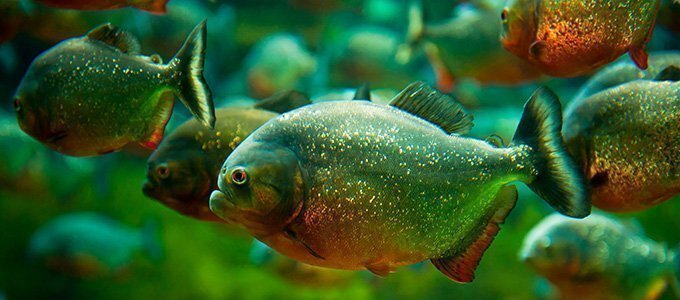 |
Latest
news from Jena and Thuringia
- For
years, the piranhas had been a major attraction at
the Botanical Garden in Jena. Now, the entire piranha
population had
to be given away. This was due to the
population getting out of control. It is believed
that visitors had secretly released another species
of piranha into the pond, which reproduced much more
quickly. As a result, the Botanical Garden was
forced to transfer the piranhas to other aquariums.
To celebrate the good old times, here‘s a video
taken by a visitor (including a feeding
session at the end). (Picture above: Adobestock)
- Jena's largest church, the Stadtkirche, has
been closed since June. This is due to a
two-kilogram piece of ceiling falling into the
church. Investigations have now revealed that the
overall structural integrity of the church is sound
- only the ceiling decoration is causing the
problem. This had been renewed in the 1950s due to
war damage. The church will remain closed for
several more months.
- There is still a repair
bonus available in Thuringia until the
end of the year. The state provides this financial
support for the repair of devices that would
otherwise have been replaced with new ones. The
funding amounts to half of the repair costs with a
maximum of 100 euros per year. Now, due to the tight
budget situation, the state of Thuringia is
ending this model project, which is unique in
Germany. In future, however, repairs can still be
carried out at the monthly Repair
Café in Jena.
- The city of Jena has included a so-called citizens'
budget in its annual budget. Jena
residents can submit proposals on how the money
(more than € 50,000) should be spent. This year, one
proposal comes directly from the university:
In order to make science more visible in the city,
some traffic lights in the city will feature a
scientific symbol (e.g. a microscope or a
microorganism) instead of the classic traffic light
man. From 1 October to 12 November, you can
vote on the proposals for the citizens'
budget.
Back to the top |
|